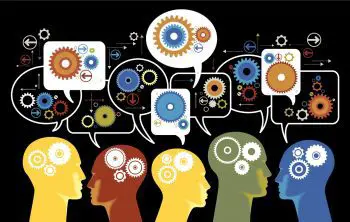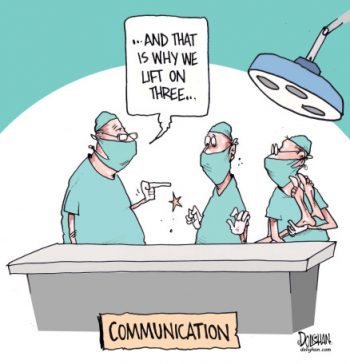By Richard West
Guest writer for Wake Up World
“If you think you’re enlightened, try spending a week with your family.” ~ Ram Dass
Recently I’ve been exploring the way I relate to my nearest and dearest, as well as other colleges and friends. How we relate to people has a massive impact on our consciousness and those around us, and seeing as our loved ones are so dear to us, it’s very important we explore how we relate to one another. Relating to the people around us can be tough, especially to the most powerful of button pushers — our family.
How I’ve related to people, until now:
As a child I often felt like I was being pushed into a box. This came from adults around me but was also often of my own making, because of a desire to please. And because of my desire to please I actually became very good at blending into whatever situation I was put in. I almost didn’t notice that in many of these situations I wasn’t ‘me’ any more. It meant that I often agreed with people because I adopted their truth as mine.
Then in my early 20’s I met a lady who encouraged me to stand in my truth, for example that I would sometimes say ‘no’ when people asked something of me, and I began to become more aware of my own energy frequency. But then the pendulum swung the other way and I would express my truth with my family, sometimes in very challenging and confrontational ways, which of course closed people down and lead to lots of angry exchanges.
So, over the years I’ve been seeking some kind of equilibrium, with the question, “how can I adequately express my own truth without undermining anybody else’s?”
One lesson that has been tough for me is to learn to become unattached to whether people understand me or not, and to accept other people’s truths even when they are go against mine and have an impact on my own life. And this has certainly been put to the test since I had children. It can be all too easy to control the vulnerable, but how do we balance setting boundaries with giving the child space to be themselves, even when their truths are sometimes so frustrating for us parents? How do we react when other significant figures in their lives treat them in ways that we don’t approve of?
It’s all about the energy.
What I’ve learnt over time and am only now beginning to really grasp, is that what you say in interactions, while important to make yourself understood, is not the most important thing. The most important thing is the quality of energy you bring to your interactions.
Here are a few ways in which you can be mindful of the energy you’re bringing to the interaction:
Look for your own ‘triggers’: Firstly it’s important to be mindful of what triggers strong emotion in you, such as anger or jealousy. When we know ourselves well enough to know how we will react to something, then we can begin to work with our reactions with awareness.
Build empathic bridges: This is hugely important. It’s not only important in our interactions to be mindful of other people’s perspectives, but also to show people that you are empathising with their perspective, even if you don’t agree with it. This shows people that you have heard them. It may seem something reasonably insignificant, but think about how it makes you feel if you are talking to someone who is not really listening and can’t wait to get their point of view across.
Teamwork: Solve any problems/issues together. Recognising that your truth is not the only truth and that, even if you think the other person is wrong, that their truth is just as important as yours. This is a massive step in conscious relating. And remember ‘compromise’ is not a four letter word.
Know when to turn the other cheek: Sometimes remaining silent is the most aligned expression, particularly during an aggressive interaction. It shows people that you are happy in your own truth and you don’t wish to engage in such an aggressive energy. Another powerful way of expressing is simply to ask a question. Try to make it as open as possible and avoid challenging questions that often begin with ‘why’. A powerful one can be “How do you think this makes me feel?”
Try to find the compassionate approach: Of course many interactions will trigger negative emotions within you. It’s important not to push these away and ignore them, but it’s also important not to project the energy onto the other person. Phrases such as “I feel angry right now. Perhaps this is not a good time to talk” can be very powerful as the other person can acknowledge your feelings without feeling like their own expression has been undermined. Then you can go away and work on yourself. ”. Let the anger express itself in a safe environment. I like to retreat into my bedroom and beat up my pillow. Then ask yourself where the anger is coming from – it’s often a need to control the situation in some way — and work to let go of this need.
People respond more to energy than words.
Test it for yourself. If you focus more on the energy you are giving an interaction you’ll start seeing interesting results. If we express our own truth clearly and compassionately then people sense this, even if it goes against their own truth. We can’t change people, just as they can’t change us, and we shouldn’t try. But, if we are focused on our expressing our truth, while acknowledging someone else’s with compassion, the interaction will always be a winning one.
‘Non-Violent’ Communication:
There’s some great work by Marshal Rosenberg on ‘non-violent’ communication. Of course this way of interaction can be difficult as we have been conditioned otherwise, but with lots of awareness and practice we begin to refine our communication with others and recognise the energetic dynamics in play during interactions. Check it out if you’re interested.
Finally, good luck. I applaud you for taking on this exploration. You need to be brutally honest with yourself. Sometimes you may not like what you see, so just go easy. Negative, ego driven interactions with people are not your fault – they are simply a result of your conditioning, so don’t judge yourself. They are, however, your responsibility so keep at it. You’ll be surprised how much better your life will become.
Also by Richard West:
- Recovering From Loss of Identity
- Listening Through the Noise: Steps Toward Inner Peace
- How to Channel Your Sadness Into Beauty
- Dying to Live – Embracing Change
- Why Die Consciously?
About the author:
Richard West is a carer, psychologist, spiritual facilitator and writer. He has worked close to death for 7 years and is passionate about helping people to move on in a conscious way, even though our society is geared to fight against death. Richard is also a spiritual facilitator at Openhand. He offers services in Spiritual Facilitation and Conscious Dying on his website ‘Back to the Source’ and writes regular articles on his blog.
- Website: www.comebacktothesource.com
- Blog: www.comebacktothesource.com/articles
- Openhand: www.openhandweb.org










